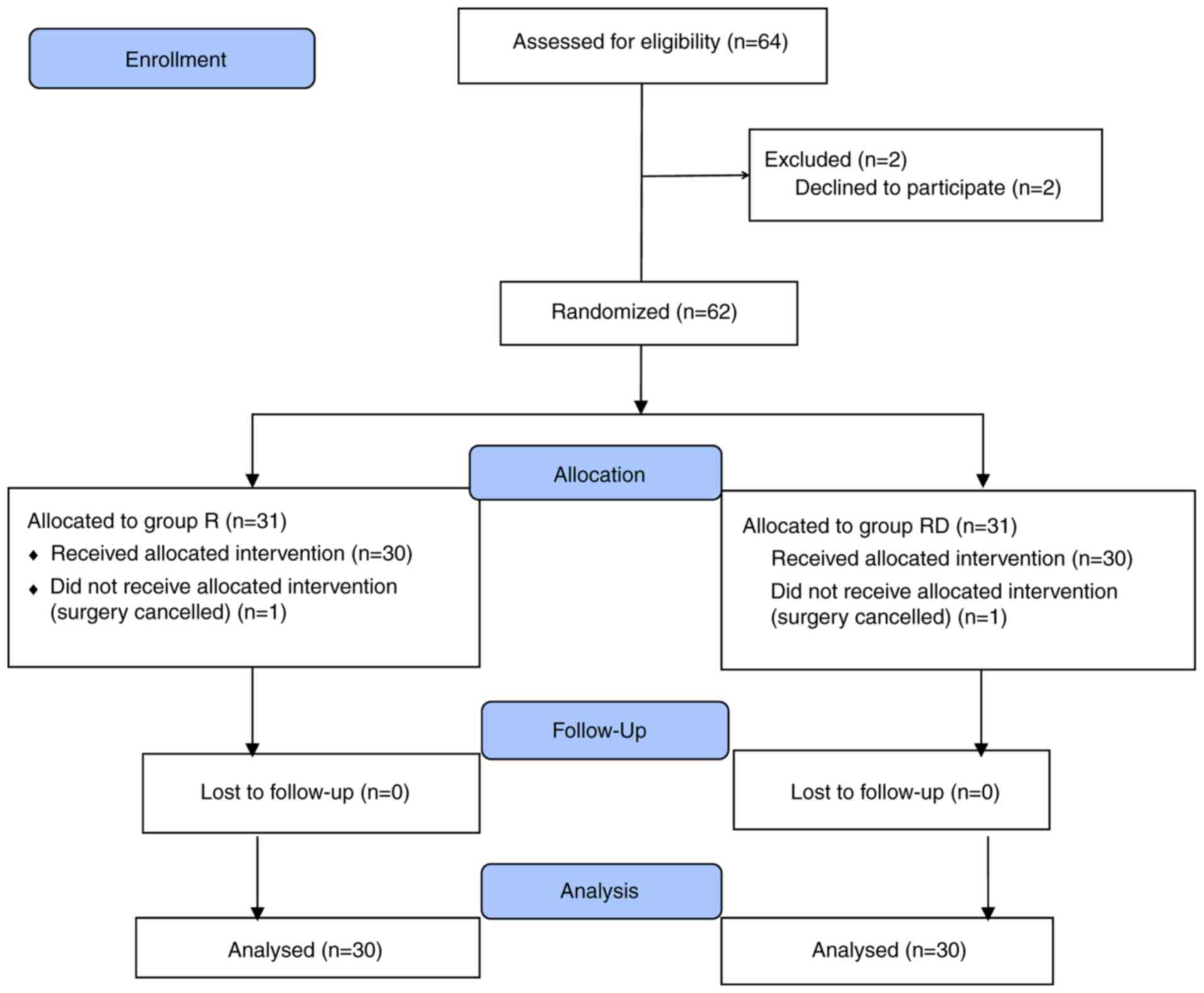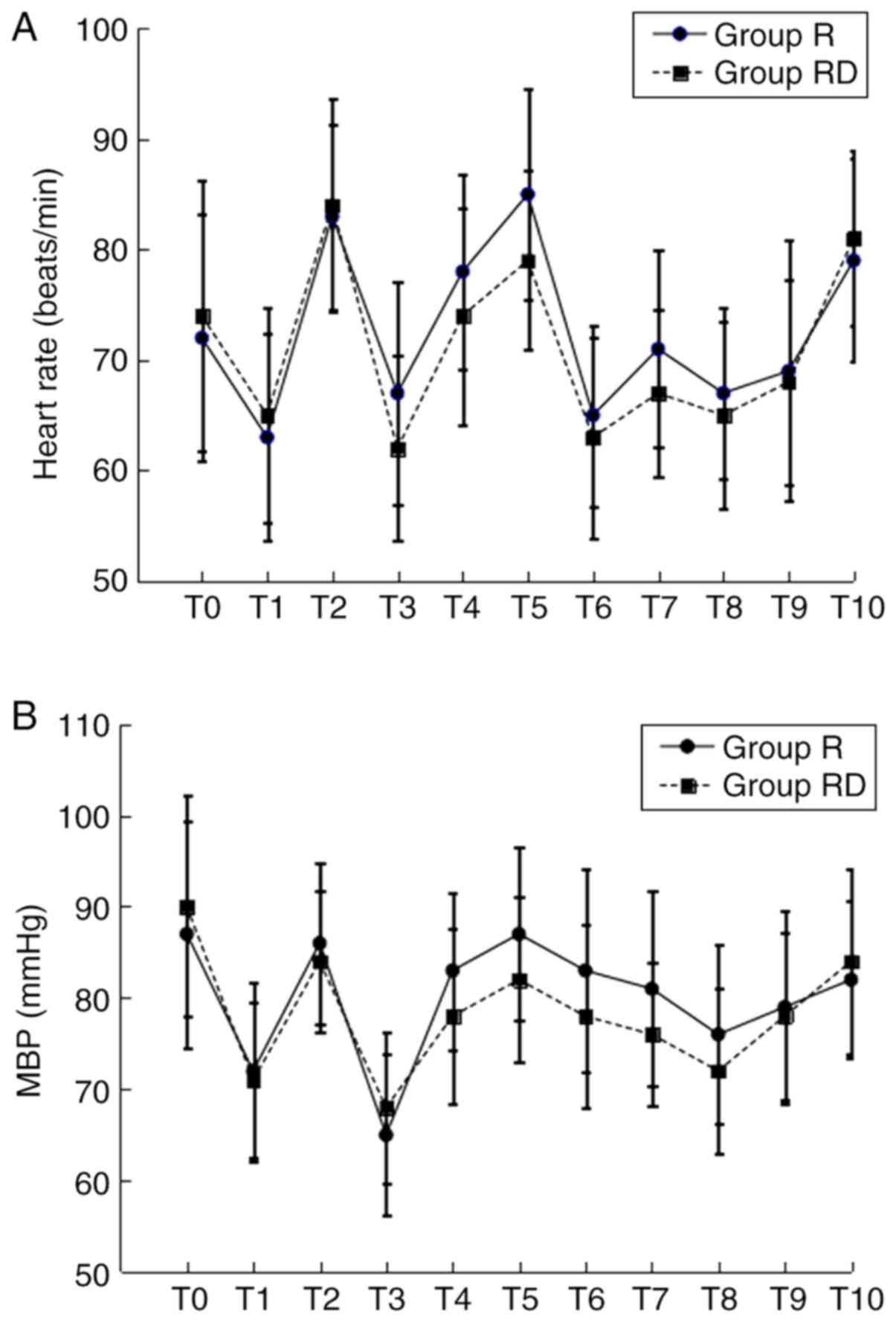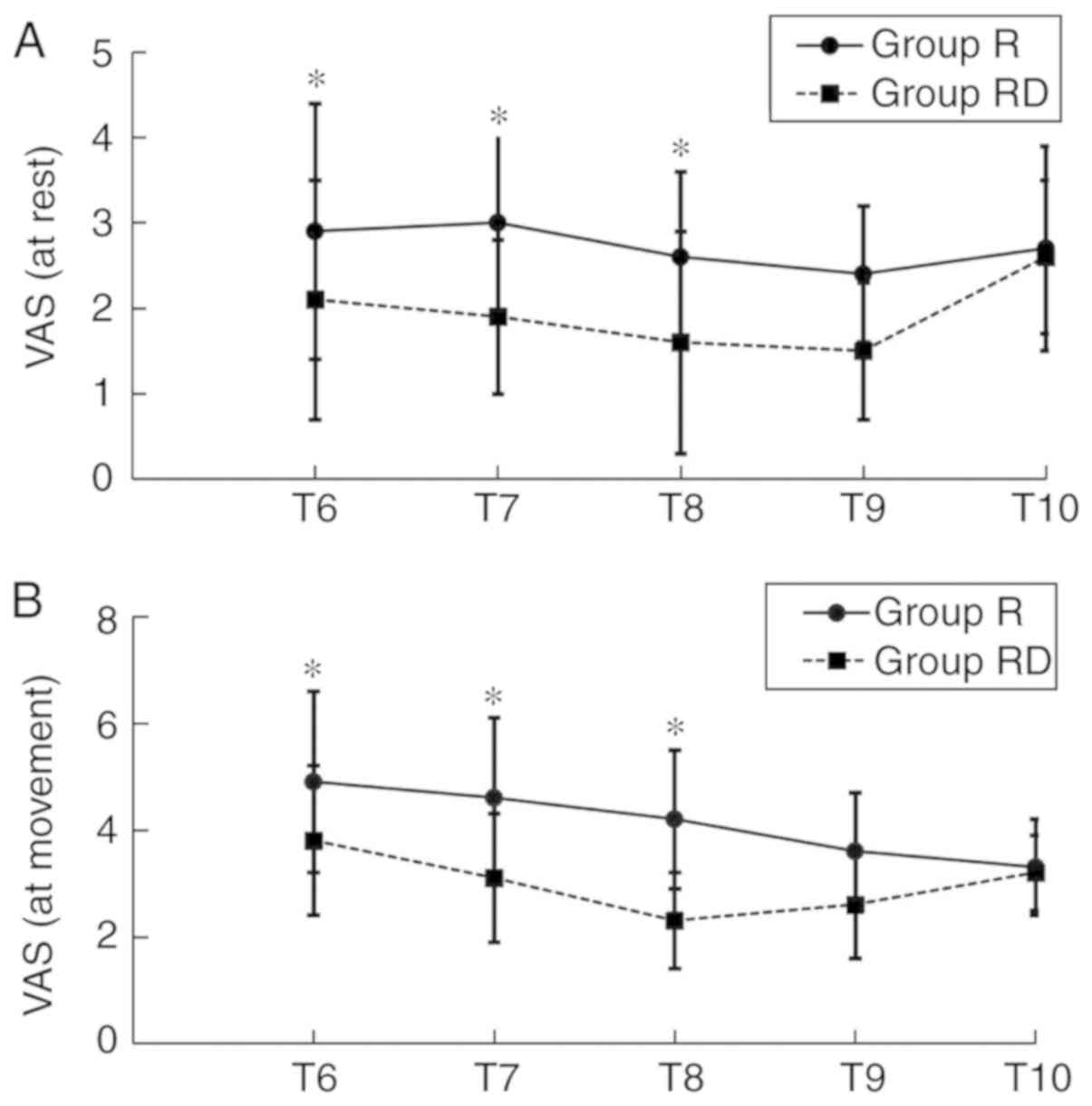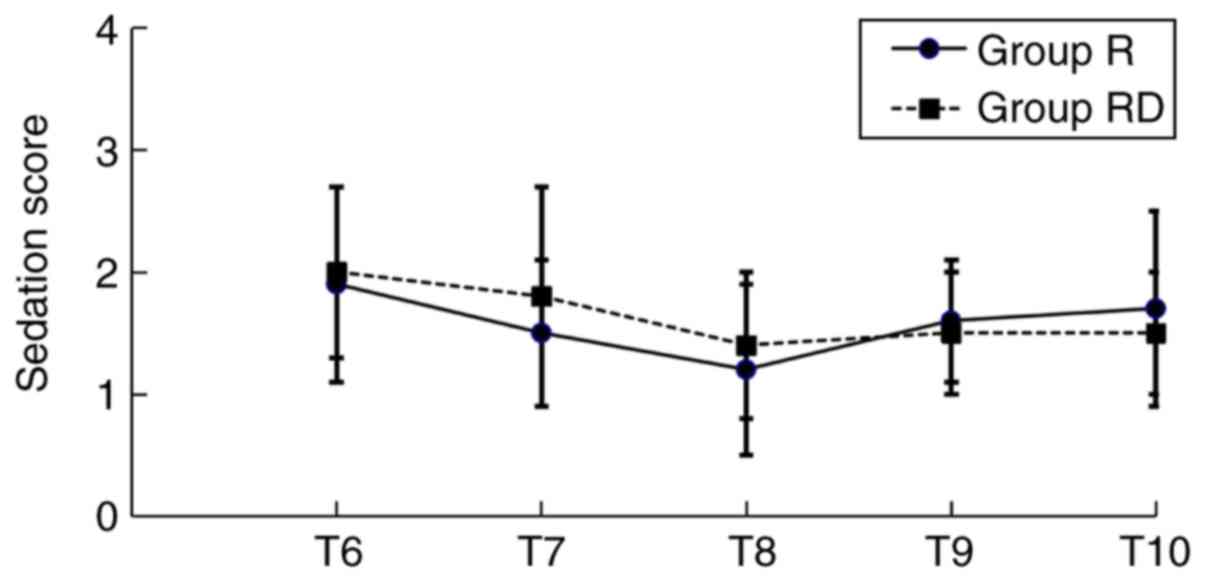|
1
|
Ong CK, Lirk P, Seymour RA and Jenkins BJ:
The efficacy of preemptive analgesia for acute postoperative pain
management: A meta-analysis. Anesth Analg. 100:757–773, table of
contents. 2005.PubMed/NCBI View Article : Google Scholar
|
|
2
|
Buvanendran A and Kroin JS: Multimodal
analgesia for controlling acute postoperative pain. Curr Opin
Anaesthesiol. 22:588–593. 2009.PubMed/NCBI View Article : Google Scholar
|
|
3
|
McDonnell JG, O'Donnell B, Curley G,
Heffernan A, Power C and Laffey JG: The analgesic efficacy of
transversus abdominis plane block after abdominal surgery: A
prospective randomized controlled trial. Anesth Analg. 104:193–197.
2007.PubMed/NCBI View Article : Google Scholar
|
|
4
|
Yu N, Long X, Lujan-Hernandez JR, Succar
J, Xin X and Wang X: Transversus abdominis-plane block versus local
anesthetic wound infiltration in lower abdominal surgery: A
systematic review and meta-analysis of randomized controlled
trials. BMC Anesthesiol. 14(121)2014.PubMed/NCBI View Article : Google Scholar
|
|
5
|
Schoenmakers KP, Wegener JT and Stienstra
R: Effect of local anesthetic volume (15 vs. 40 ml) on the duration
of ultrasound-guided single shot axillary brachial plexus block: A
prospective randomized, observer-blinded trial. Reg Anesth Pain
Med. 37:242–247. 2012.PubMed/NCBI View Article : Google Scholar
|
|
6
|
Ilfeld BM: Continuous peripheral nerve
blocks: A review of the published evidence. Anesth Analg.
113:904–925. 2011.PubMed/NCBI View Article : Google Scholar
|
|
7
|
Kirksey MA, Haskins SC, Cheng J and Liu
SS: Local anesthetic peripheral nerve block adjuvants for
prolongation of analgesia: A systematic qualitative review. PLoS
One. 10(e0137312)2015.PubMed/NCBI View Article : Google Scholar
|
|
8
|
Gerlach AT and Dasta JF: Dexmedetomidine:
An updated review. Ann Pharmacother. 41:245–252. 2007.PubMed/NCBI View Article : Google Scholar
|
|
9
|
Blaudszun G, Lysakowski C, Elia N and
Tramer MR: Effect of perioperative systemic α2 agonists on
postoperative morphine consumption and pain intensity: Systematic
review and meta-analysis of randomized controlled trials.
Anesthesiology. 116:1312–1322. 2012.PubMed/NCBI View Article : Google Scholar
|
|
10
|
Brummett CM, Hong EK, Janda AM, Amodeo FS
and Lydic R: Perineural dexmedetomidine added to ropivacaine for
sciatic nerve block in rats prolongs the duration of analgesia by
blocking the hyperpolarization-activated cation current.
Anesthesiology. 115:836–843. 2011.PubMed/NCBI View Article : Google Scholar
|
|
11
|
Brummett CM, Norat MA, Palmisano JM and
Lydic R: Perineural administration of dexmedetomidine in
combination with bupivacaine enhances sensory and motor blockade in
sciatic nerve block without inducing neurotoxicity in rat.
Anesthesiology. 109:502–511. 2008.PubMed/NCBI View Article : Google Scholar
|
|
12
|
Marhofer D, Kettner SC, Marhofer P, Pils
S, Weber M and Zeitlinger M: Dexmedetomidine as an adjuvant to
ropivacaine prolongs peripheral nerve block: A volunteer study. Br
J Anaesth. 110:438–442. 2013.PubMed/NCBI View Article : Google Scholar
|
|
13
|
Gandhi R, Shah A and Patel I: Use of
dexmedetomidine along with bupivacaine for brachial plexus block.
National J Med Res. 2:67–69. 2012.
|
|
14
|
Hebbard P, Fujiwara Y, Shibata Y and Royse
C: Ultrasound-guided transversus abdominis plane (TAP) block.
Anaesth Intensive Care. 35:616–617. 2007.PubMed/NCBI
|
|
15
|
Ris F, Findlay JM Hompes R, Rashid A,
Warwick J, Cunningham C, Jones O, Crabtree N and Lindsey I:
Addition of transversus abdominis plane block to patient controlled
analgesia for laparoscopic high anterior resection improves
analgesia, reduces opioid requirement and expedites recovery of
bowel function. Ann R Coll Surg Engl. 96:579–585. 2014.PubMed/NCBI View Article : Google Scholar
|
|
16
|
Nader A, Doty R Jr, Brodskaia A, Kendall
MC and McCarthy RJ: Sensory testing of distal sural and posterior
tibial nerves provides early prediction of surgical anesthesia
after single-injection infragluteal-parabiceps sciatic nerve block.
Anesth Analg. 110:951–957. 2010.PubMed/NCBI View Article : Google Scholar
|
|
17
|
Overdyk FJ, Carter R, Maddox RR, Callura
J, Herrin AE and Henriquez C: Continuous oximetry/capnometry
monitoring reveals frequent desaturation and bradypnea during
patient-controlled analgesia. Anesth Analg. 105:412–418.
2007.PubMed/NCBI View Article : Google Scholar
|
|
18
|
Rafi AN: Abdominal field block: A new
approach via the lumbar triangle. Anaesthesia. 56:1024–1026.
2001.PubMed/NCBI View Article : Google Scholar
|
|
19
|
Hain E, Maggiori L, Prost À la Denise J
and Panis Y: Transversus abdominis plane (TAP) block in
laparoscopic colorectal surgery improves postoperative pain
management: A meta-analysis. Colorectal Dis. 20:279–287.
2018.PubMed/NCBI View Article : Google Scholar
|
|
20
|
Kanazi GE, Aouad MT, Abdallah FW, Khatib
MI, Adham AM, Harfoush DW and Siddik-Sayyid SM: The analgesic
efficacy of subarachnoid morphine in comparison with
ultrasound-guided transversus abdominis plane block after cesarean
delivery: A randomized controlled trial. Anesth Analg. 111:475–481.
2010.PubMed/NCBI View Article : Google Scholar
|
|
21
|
Corvetto MA, Echevarria GC, De La Fuente
N, Mosqueira L, Solari S and Altermatt FR: Comparison of plasma
concentrations of levobupivacaine with and without epinephrine for
transversus abdominis plane block. Reg Anesth Pain Med. 37:633–637.
2012.PubMed/NCBI View Article : Google Scholar
|
|
22
|
Akkaya A, Yildiz I, Tekelioglu UY,
Demirhan A, Bayir H, Ozlu T, Bilgi M and Kocoglu H: Dexamethasone
added to levobupivacaine in ultrasound-guided tranversus abdominis
plain block increased the duration of postoperative analgesia after
caesarean section: a randomized, double blind, controlled trial.
Eur Rev Med Pharmacol Sci. 18:717–722. 2014.PubMed/NCBI
|
|
23
|
Bollag L, Richebe P, Siaulys M, Ortner CM,
Gofeld M and Landau R: Effect of transversus abdominis plane block
with and without clonidine on post-cesarean delivery wound
hyperalgesia and pain. Reg Anesth Pain Med. 37:508–514.
2012.PubMed/NCBI View Article : Google Scholar
|
|
24
|
Carollo DS, Nossaman BD and Ramadhyani U:
Dexmedetomidine: A review of clinical applications. Curr Opin
Anaesthesiol. 21:457–461. 2008.PubMed/NCBI View Article : Google Scholar
|
|
25
|
Obayah GM, Refaie A, Aboushanab O,
Ibraheem N and Abdelazees M: Addition of dexmedetomidine to
bupivacaine for greater palatine nerve block prolongs postoperative
analgesia after cleft palate repair. Eur J Anaesthesiol.
27:280–284. 2010.PubMed/NCBI View Article : Google Scholar
|
|
26
|
Khandaitkar S, Kolte V, Shenoi SR and
Budhraja N: A clinical study to determine the efficacy of 7ppm
dexmedetomidine as an adjuvant to 2% lignocaine in infraorbital
nerve block. Br J Oral Maxillofac Surg. 54:997–1000.
2016.PubMed/NCBI View Article : Google Scholar
|
|
27
|
Esmaoglu A, Yegenoglu F, Akin A and Turk
CY: Dexmedetomidine added to levobupivacaine prolongs axillary
brachial plexus block. Anesth Analg. 111:1548–1551. 2010.PubMed/NCBI View Article : Google Scholar
|
|
28
|
Lin YN, Li Q, Yang RM, Mao ZX and Liu JC:
Addition of dexmedetomidine to ropivacaine improves cervical plexus
block. Acta Anaesthesiol Taiwan. 51:63–66. 2013.PubMed/NCBI View Article : Google Scholar
|
|
29
|
Brummett CM, Padda AK, Amodeo FS, Welch KB
and Lydic R: Perineural dexmedetomidine added to ropivacaine causes
a dose-dependent increase in the duration of thermal
antinociception in sciatic nerve block in rat. Anesthesiology.
111:1111–1119. 2009.PubMed/NCBI View Article : Google Scholar
|
|
30
|
Bisui B, Samanta S, Ghoshmaulik S,
Banerjee A, Ghosh TR and Sarkar S: Effect of locally administered
dexmedetomidine as adjuvant to levobupivacaine in supraclavicular
brachial plexus block: Double-blind controlled Study. Anesth Essays
Res. 11:981–986. 2017.PubMed/NCBI View Article : Google Scholar
|
|
31
|
Rancourt MP, Albert NT, Côté M, Létourneau
DR and Bernard PM: Posterior tibial nerve sensory blockade duration
prolonged by adding dexmedetomidine to ropivacaine. Anesth Analg.
115:958–962. 2012.PubMed/NCBI View Article : Google Scholar
|
|
32
|
Iskandar H, Benard A, Ruel-Raymond J,
Cochard G and Manaud B: The analgesic effect of interscalene block
using clonidine as an analgesic for shoulder arthroscopy. Anesth
Analg. 96:260–262. 2003.PubMed/NCBI View Article : Google Scholar
|
|
33
|
Dalle C, Schneider M, Clergue F, Bretton C
and Jirounek P: Inhibition of the I(h) current in isolated
peripheral nerve: A novel mode of peripheral antinociception?
Muscle Nerve. 24:254–261. 2001.PubMed/NCBI View Article : Google Scholar
|
|
34
|
Massad IM, Mohsen WA, Basha AS, Al-Zaben
KR, Al-Mustafa MM and Alghanem SM: A balanced anesthesia with
dexmedetomidine decreases postoperative nausea and vomiting after
laparoscopic surgery. Saudi Med J. 30:1537–1541. 2009.PubMed/NCBI
|
|
35
|
Schnabel A, Meyer-Frießem CH, Reichl SU,
Zahn PK and Pogatzki-Zahn EM: Is intraoperative dexmedetomidine a
new option for postoperative pain treatment? A meta-analysis of
randomized controlled trials. Pain. 154:1140–1149. 2013.PubMed/NCBI View Article : Google Scholar
|
|
36
|
Cheung CW, Qiu Q, Ying AC, Choi SW, Law WL
and Irwin MG: The effects of intra-operative dexmedetomidine on
postoperative pain, side-effects and recovery in colorectal
surgery. Anaesthesia. 69:1214–1221. 2014.PubMed/NCBI View Article : Google Scholar
|
|
37
|
Bekker A, Haile M, Kline R, Didehvar S,
Babu R, Martiniuk F and Urban M: The effect of intraoperative
infusion of dexmedetomidine on the quality of recovery after major
spinal surgery. J Neurosurg Anesthesiol. 25:16–24. 2013.PubMed/NCBI View Article : Google Scholar
|


















